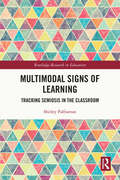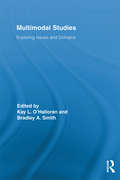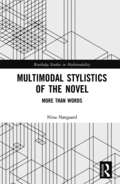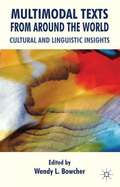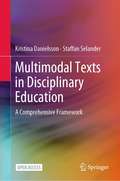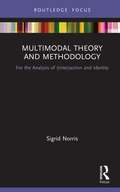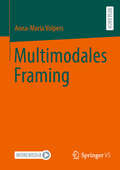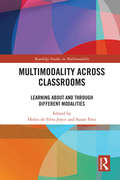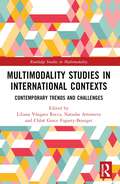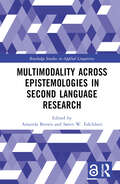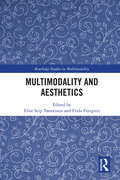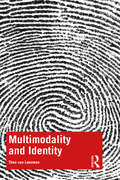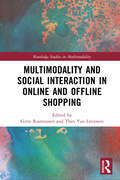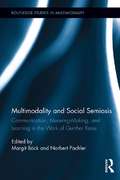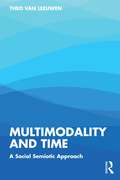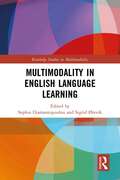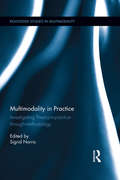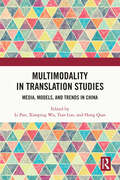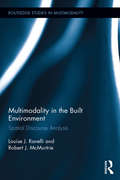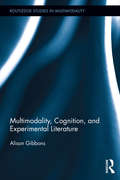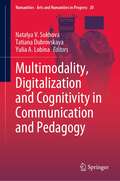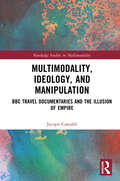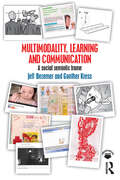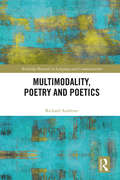- Table View
- List View
Multimodal Signs of Learning: Tracking Semiosis in the Classroom (Routledge Research in Education)
by Shirley PalframanMultimodal Signs of Learning proposes a methodology to uncover evidence of learning in students’ multimodal compositions. Informed by social semiotic theory, the book tracks representation of subject content from physical and embodied teaching resources to students’ handmade artefacts and physical presentations. Using materials from secondary school history and science classrooms, multimodal realizations of specific representational processes are tracked from the input of resources through to the students’ multimodal compositions – their posters, models and physical presentations. Through tracking semiosis, the book exposes the epistemologies inherent in the representational choices articulated in the students’ multimodal designs. These, it is argued, are to be valued as signs of learning. Learning is thus characterized as ‘design’ and the transformation of subject content through representation in different modes shown not only to promote learning, but also to contain evidence for its recognition. The book raises important questions about what constitutes multimodal learning and how it can be applied. It contributes to the growing body of research into the changing dynamics of classrooms and assessment practices and will be of great interest to researchers, and academics in the fields of education research, multimodality, semiotics and communication.
Multimodal Studies: Exploring Issues and Domains (Routledge Studies in Multimodality)
by Kay L. O’Halloran Bradley A. Smith New YorkThe phenomenon of multimodality has, as Jewitt observes, generated interest "across many disciplines...against the backdrop of considerable social change." Contemporary societies are grappling with the social implications of the rapid increase in sophistication and range of multimodal practices, particularly within interactive digital media, so that the study of multimodality also becomes essential within an increasing range of practical domains. As a result of this increasing interest in multimodality, scholars, teachers and practitioners are on the one hand uncovering many different issues arising from its study, such as those of theory and methodology, while also exploring multimodality within an increasing range of domains. Such an increase and range of interest in multimodality heralds the emergence of a distinct multimodal studies field: as both the mapping of a domain of enquiry, and as the site of the development of theories, descriptions and methodologies specific to and adapted for the study of multimodality. The present volume presents a range of works by an impressive international roster of contributors who both explore issues arising from the study of multimodality and explore the scope of this emerging field within specific domains of multimodal phenomena. Contributors aim to show that each individual work and works in general within multimodal studies represent a dialectic or complementarity between the exploration of issues of general significance to multimodal studies and the exploration of specific domains of multimodality; while characterizing specific works as tending to some degree towards one or other of these main areas of focus. Such a characterization is seen as part of a move towards the identification and thus development of a distinct field of multimodal studies.
Multimodal Stylistics of the Novel: More than Words (Routledge Studies in Multimodality)
by Nina NørgaardThis book advocates for a new analytical framework that extends our understanding of multimodal meaning-making in the novel. Integrating theoretical traditions from stylistics and the influential social semiotic approach to multimodal communication developed by Kress and van Leeuwen, Nørgaard applies this method of analysis in order to build on existing stylistic practices that look at linguistic features in the novel to encompass other semiotic resources found in the form, such as typography, layout, images, paper and book-cover design. The volume grounds the discussion with supporting examples from novels that feature experimentation with multiple semiotic resources as well as more traditional novels, furthering the argument that all novels are inherently multimodal. Offering new insights and tools for unpacking multimodal meaning-making in this critical literary genre, this volume is an indispensable resource for graduate students and researchers in multimodality, stylistics and literary studies.
Multimodal Texts from Around the World
by Wendy L. BowcherA first in multimodal/multisemiotic discourse studies this collection of original articles by international scholars focuses primarily on texts from non-English speaking contexts. The illuminating insights enhance our understanding of how language and other semiotic resources construe specific cultural and social concerns.
Multimodal Texts in Disciplinary Education: A Comprehensive Framework
by Kristina Danielsson Staffan SelanderThis open access book provides an introduction to multimodality and the role of multimodal texts in today’s education. Presenting a comprehensive framework for analysing and working with multimodal texts in disciplinary education, it serves as a tool for researchers and teachers alike. The second part of the book focuses on sample analyses of a variety of educational texts for different age groups and from different disciplines, including games and online resources. The authors also comment on the specific challenges of each text, and how teachers can discuss such texts with their students to enhance both their understanding of the content and their multimodal literacy. The book is intended for researchers in fields like education and multimodal studies, and for teacher educators, regardless of school subject or age group. With the combined perspectives on text analysis and implications for education, the book addresses the needs of teachers who want to work with multimodal aspects of texts in education in informed ways, but lack the right tools for such work.
Multimodal Theory and Methodology: For the Analysis of (Inter)action and Identity (Routledge Focus on Linguistics)
by Sigrid NorrisThis concise guide outlines core theoretical and methodological developments of the growing field of Multimodal (Inter)action Analysis. The volume unpacks the foundational relationship between multimodality and language and the key concepts which underpin the analysis of multimodal action and interaction and the study of multimodal identity. A focused overview of each concept charts its historical development, reviews the essential literature, and outlines its underlying theoretical frameworks and how it links to analytical tools. Norris illustrates the concept in practice via the inclusion of examples and an image-based transcript, table, or graph. The book provides a succinct overview of the latest research developments in the field of Multimodal (Inter)action Analysis for early career scholars in the field as well as established researchers looking to stay up-to-date on core developments and learn more about a complementary approach to systemic functional and social semiotic frameworks.
Multimodales Framing
by Anna-Maria VolpersIn diesem Buch führt Anna-Maria Volpers den kommunikationswissenschaftlichen Framing-Ansatz mit der interdisziplinären Forschung zu visueller und multimodaler Kommunikation zusammen. Dabei werden sowohl Theorien und Methoden als auch der Stand der empirischen Forschung betrachtet. Die Autorin gibt zunächst einen Überblick über die allgemeine (verbale) Framing-Forschung. Anschließend werden Grundlagen der visuellen und multimodalen Kommunikation aus Perspektive der Semiotik, Linguistik und Psychologie erläutert. Es folgt eine systematische Analyse des Forschungsstands zu Bildern und Multimodalität. Diese umfasst Medien-Frames, strategisches und journalistisches Framing sowie Rezeption und Wirkung von Frames. Im Ergebnis werden Desiderate und Anforderungen an empirische Studien formuliert und eine interdisziplinäre Landkarte der multimodalen Framing-Forschung gezeichnet.
Multimodality Across Classrooms: Learning About and Through Different Modalities (Routledge Studies in Multimodality)
by Susan Feez Helen de Silva JoyceThis volume takes a broad view of multimodality as it applies to a wide range of subject areas, curriculum design, and classroom processes to examine the ways in which multiple modes combine in contemporary classrooms and its subsequent impact on student learning. Grounded in a systemic functional linguistic framework and featuring contributions from scholars across educational and multimodal research, the book begins with a historical overview of multimodality’s place in Western education and then moves to a discussion of the challenges and rewards of integrating multimodal texts and ever-evolving technologies in a variety of settings, include primary, language, music, early childhood, Montessori, and online classrooms. As a state of the art of teaching and learning through different modalities in different educational contexts, this book is an indispensable resource for students and scholars in applied linguistics, multimodality, and language education.
Multimodality Studies in International Contexts: Contemporary Trends and Challenges (Routledge Studies in Multimodality)
by Liliana Vásquez RoccaThis collection responds to the need for theoretically informed and methodologically grounded empirical research on the global transformations in multimodal human communication and social practices in light of recent widespread change. The volume highlights the need to expand on the established approaches--Social Semiotics, Multimodal Discourse Analysis, and Multimodal (Inter)action Analysis--by complementing them with other analytical frameworks to better understand the impact of unprecedented global challenges, such as Covid-19, on the way humans communicate and make use of meaning-making resources. Bringing together established and emergent scholars from a variety of geographical, cultural, and linguistic contexts, the collection presents studies from both the Global North and Global South, including South Africa, Latin America, Brazil, and the Caribbean, to showcase new perspectives in multimodality research. This innovative book will be of interest to students and scholars in multimodality, social semiotics, and discourse analysis.
Multimodality across Epistemologies in Second Language Research (Routledge Studies in Applied Linguistics)
by Amanda Brown and Søren W. EskildsenThis collection highlights diverse epistemological perspectives in original research on the important role of multimodality in second language contexts. The volume explores a wide range of theoretical and methodological traditions toward foregrounding the notion that bodily action is not merely an add-on to the modality of talk but an integral part of second language teaching, learning, and interaction. Following an introductory chapter, 18 empirical chapters feature either classroom or non-classroom research, which shed light on different dimensions of multimodality in second language contexts, including learning reflected in gesture, learning gesture across languages, the role of bodily action in language teaching, and the role of movement in configuring space for effective communication. Each empirical chapter follows a consistent structure detailing the research focus, the background to each study, methodology, and findings. A concluding synthesis chapter braids the insights of these chapters, drawing parallels across different methods, and pointing toward crosscutting areas for future research. This book will be of interest to students and scholars in applied linguistics, multilingualism, bilingualism, gesture studies, cognitive science, and psychology.Chapters 10 and 11 of this book are available for free in PDF format as Open Access at www.taylorfrancis.com. They has been made available under a Creative Commons Attribution-NonCommercial-ShareAlike (CC-BY-NC-SA) 4.0 International license.
Multimodality and Aesthetics (Routledge Studies in Multimodality)
by Elise Seip Tønnessen Frida ForsgrenThis volume explores the relationship between aesthetics and traditional multimodal communication to show how all semiotic resources, not just those situated within fine arts, have an aesthetic function. Bringing together contributions from an interdisciplinary group of researchers, the book meditates on the role of aesthetics in a broader range of semiotic resources, including urban spaces, blogs, digital scrapbooks, children’s literature, music, and online learning environments. The result is a comprehensive collection of new perspectives on how communication and aesthetics enrich and complement one another when meaning is made with semiotic resources, making this key reading for students and scholars in multimodality, fine arts, education studies, and visual culture.
Multimodality and Identity
by Theo van LeeuwenThis book brings together the work of leading theorist, Theo van Leeuwen, on typography, colour, texture, sound and movement, and shows how they are used to communicate identity, both corporate and individual. The book provides a detailed approach to analysing the key elements of multimodal style, and shows how these can be applied to a wide range of domains, including typography, product design, architecture, and animation films. Combining sociological insights into contemporary forms of identity with multimodal approaches to analysing how these identities are expressed, the text is richly illustrated with examples from fashion, the built environment, logos, modern art and more. With sample analyses, this user-friendly text provides clear methods for analysis and creative strategies for the practice of multimodal communication. Providing an invaluable toolkit to analysing the key elements of multimodal design and the way they work together, this book is essential reading for students, teachers and researchers in the field of multimodal communication, whether in communication studies, linguistics, design studies, media studies or the arts.
Multimodality and Social Interaction in Online and Offline Shopping (Routledge Studies in Multimodality)
by Theo van Leeuwen Gitte RasmussenThis collection brings together social semiotic, ethnographic, and conversation analytic approaches to multimodality in global studies of shopping, drawing on the rich diversity of the latest multimodal methods to critically reflect on shopping as a cornerstone of contemporary social life. The volume explores shopping as an area of study in its own right, with the buying and selling of goods and services a fundamental part of the social and cultural life of human communities for centuries. The book looks at both online and offline shopping, examining it as both everyday multi-sensorial practice and its translation into the interactive text and imagery that comprise the online shopping experience, from London street markets to Japanese grocery shops to Danish supermarkets to worldwide online shopping sites. Highlighting the diversity of modern multimodal approaches through contributions from established scholars, the book critically surveys both the challenges and opportunities in the embodied interactions between buyers and sellers and how these points of connection have been translated and will continue to transform in the age of algorithms and emergent technologies. This book will appeal to students and scholars interested in multimodality, multimodal conversation analysis, social semiotics, social interaction, and retail studies.
Multimodality and Social Interaction in Online and Offline Shopping (Routledge Studies in Multimodality)
by Theo van Leeuwen Gitte RasmussenThis collection brings together social semiotic, ethnographic, and conversation analytic approaches to multimodality in global studies of shopping, drawing on the rich diversity of the latest multimodal methods to critically reflect on shopping as a cornerstone of contemporary social life.The volume explores shopping as an area of study in its own right, with the buying and selling of goods and services a fundamental part of the social and cultural life of human communities for centuries. The book looks at both online and offline shopping, examining it as both everyday multi-sensorial practice and its translation into the interactive text and imagery that comprise the online shopping experience, from London street markets to Japanese grocery shops to Danish supermarkets to worldwide online shopping sites. Highlighting the diversity of modern multimodal approaches through contributions from established scholars, the book critically surveys both the challenges and opportunities in the embodied interactions between buyers and sellers and how these points of connection have been translated and will continue to transform in the age of algorithms and emergent technologies.This book will appeal to students and scholars interested in multimodality, multimodal conversation analysis, social semiotics, social interaction, and retail studies.
Multimodality and Social Semiosis: Communication, Meaning-Making, and Learning in the Work of Gunther Kress (Routledge Studies in Multimodality)
by Norbert Pachler Margit BöckGunther Kress, one of the founders of social semiotics and multimodality, has made lasting contributions to these fields through his work in semiotics and meaning-making; power and identity; agency, design, production; and pedagogy and learning; in varied sites of transformation. This book brings together leading scholars in a variety of disciplines, including social semiotics, pedagogy, linguistics, media and communication studies, new literacy studies, ethnography, academic literacy, literary criticism and, more recently, medical/clinical education, to examine and build upon his work. This disciplinary diversity is evidence of the ways in which Kress' work has influenced and been influenced by a wide range of academic work and intellectual endeavors and how it has been used to lay foundations for theory-building and concept development in a varied yet connected range of areas. The individual contributions to the book pick up the threads of the often collaborative work of the authors with Kress; they show how these approaches were subsequently developed and discuss what future trajectories the authors see for them.
Multimodality and Time: A Social Semiotic Approach
by Theo van LeeuwenThis ground-breaking book brings together the work of leading theorist, Theo van Leeuwen, on time-based multimodal forms of communication including speech, music, and film.With chapters on the fundamental meaning-making role of rhythm, time in music, time in film, the representation of time and timing in language, and the visualization of time, this book offers a comprehensive approach to the subject that supplements the author’s earlier work on visual communication. This book is richly illustrated with examples, including analyses of time management texts, everyday interactions such as waitressing in a restaurant, classic and contemporary films, television crime series and documentaries, a wide variety of kinds of music, online educational software, and SmartArt templates for the diagrammatic representation of time-based practices. Every chapter also includes questions and exercises to reinforce and extend learning. Written in an accessible style, it will be essential reading for students, teachers, and researchers in the field of multimodal communication, whether in communication studies, media studies, or linguistics.
Multimodality in English Language Learning (Routledge Studies in Multimodality)
by Sophia DiamantopoulouThis edited volume provides research-based knowledge on the use, production and assessment of multimodal texts in the teaching and learning of English as an Additional Language (EAL). The book reflects growing interest in research on EAL, with increasing numbers of learners of English worldwide and the growing relevance of EAL to numerous education systems. The volume examines different aspects of English from a multimodal perspective, showcasing empirical research from across five continents and all three levels of education. Applying frameworks based on Multimodal Social Semiotics and Systemic Functional Linguistics, chapters focus on the use and affordances of multimodal texts in pedagogy, literature, culture, text production, assessment and curriculum development connected to EAL. Directing attention to the significance of modes beyond speech and writing in EAL, the volume provides a wide range of perspectives and experiences that can be applied more widely and inspire other practices in the global and diverse field of EAL teaching, learning and assessment. This collection will be of interest to scholars in multimodality, language education, and teacher education.
Multimodality in Practice: Investigating Theory-in-Practice-through-Methodology (Routledge Studies in Multimodality)
by Sigrid NorrisIn this wide-ranging collection, leading scholars, researchers, and emergent researchers from around the world come together and present examples of multimodal discourse analysis in practice. The book illustrates new theoretical, methodological and empirical research into new technologies such as the internet, software, CD-ROM, video, and older technologies such as film, newspapers, brands or billboards. Each chapter demonstrates how aspects of multimodal theory and method can be used to conduct research into these and other multimodal texts. Taken together, the book advances the field of multimodal discourse analysis and offers a range of current studies that address some of the most important questions facing researchers and students when investigating new or old technologies multimodally in linguistics, education, communication studies, sociology, anthropology and other fields.
Multimodality in Translation Studies: Media, Models, and Trends in China
by Hong Qian Tian Luo Li Pan Xiaoping WuFocusing on multimodality in translation studies, this edited volume provides insights into the trends and practices of multimodal translation in a variety of media. Divided into four main themes, the book explores audiovisual translation in digital media, multimodal translation of Chinese classics, multimodal design in website translation, and the use of paratexts in conference interpreting. Contributors draw on a diverse range of methods and theoretical models, including systemic functional multimodal discourse analysis, narrative theory, Skopos-functional theory, multimodal analysis of digital discourse, and corpus-based multimodal analysis. It covers important topics in media translation, ranging from emerging multimodal translation models to multimodal creativity in interlingual subtitling for social media and identity construction in the multimodal translation of food advertising. Through robust empirical studies, the book aims to shed light on the methodological development of multimodal translation in different media forms, including social media, websites, on-site interactions and books. The title will be of great value to scholars and students of linguistics, translation studies, multimodal discourse analysis and digital media.
Multimodality in the Built Environment: Spatial Discourse Analysis (Routledge Studies in Multimodality)
by Louise J. Ravelli Robert J. McmurtrieThis book provides an extended exploration of the multimodal analysis of spatial (three-dimensional) texts of the built environment, culminating in a holistic approach termed Spatial Discourse Analysis (SpDA). Based on existing frameworks frameworks of multimodal analysis, this book applies, adapts, and extends these frameworks to spatial texts. The authors argue that choices in spatial design create meanings about what we perceive and how we can or should behave, influence how we feel in and about those spaces, and enable these texts to function as coherent wholes. Importantly, a spatial text, once built, is also a resource which is then used, and an essential aspect of understanding these texts is to consider what users themselves contribute to the meaning potential of these texts. The book takes the metafunctional approach familiar from Systemic-Functional Linguistics (SFL) and foregrounds each metafunction in turn (textual, interpersonal, experiential, and logical), in relation to the detailed analysis of a particular spatial text.
Multimodality, Cognition, and Experimental Literature (Routledge Studies in Multimodality)
by Alison GibbonsSince the turn of the millennium, there has seen an increase in the inclusion of typography, graphics and illustration in fiction. This book engages with visual and multimodal devices in twenty-first century literature, exploring canonical authors like Mark Z. Danielewski and Jonathan Safran Foer alongside experimental fringe writers such as Steve Tomasula, to uncover an embodied textual aesthetics in the information age. Bringing together multimodality and cognition in an innovative study of how readers engage with challenging literature, this book makes a significant contribution to the debates surrounding multimodal design and multimodal reading. Drawing on cognitive linguistics, cognitive psychology, neuroscience, semiotics, visual perception, visual communication, and multimodal analysis, Gibbons provides a sophisticated set of critical tools for analysing the cognitive impact of multimodal literature.
Multimodality, Digitalization and Cognitivity in Communication and Pedagogy (Numanities - Arts and Humanities in Progress #20)
by Natalya V. Sukhova Tatiana Dubrovskaya Yulia A. LobinaThis book positions itself at the intersection of the key areas of the modern humanities. Different authors from a variety of countries take innovative approaches to investigating multimodal communication, adapting pedagogical design to digital environments and enhancing cognitive skills through transformations in teaching and learning practices. The eclectic forms under study require eclectic approaches and methodologies, and the authors cross disciplinary boundaries drawing on philosophy, linguistics, semiotics, computational linguistics, mathematics, cognitive studies and neuroaesthetics. Part I presents methods of analysing multimodal communication in its different displays, covering promotional video in crowdfunding project presentations, multimodal public signs of prohibition and visuals as arguments. Part II explores varied teaching methodologies that have emerged as a result of and in response to modern technological changes and contains some practical hints for educators. It demonstrates the pedagogical potential of video games, virtual worlds, linguistic corpora and online dictionaries. Part III focuses on psychological and cognitive factors influencing success in the classroom, primarily, ways of developing students’ and teachers’ personalities. The volume sits at the intersection between Communication Studies, Digital Humanities, Discourse Analysis, Education Theory and Cognitive Studies and is useful to scholars and students of communication, languages, education and other areas of the humanities. This book should trigger scholarly discussions as well as stimulating practitioners’ interest in these fields.
Multimodality, Ideology, and Manipulation: BBC Travel Documentaries and the Illusion of Empire (Routledge Studies in Multimodality)
by Jacopo CastaldiThis book examines how sociopolitical and intercultural ideologies surrounding globalisation and neoliberalism are constructed and negotiated in travel documentaries, focusing on the role of the BBC in reproducing neo-imperialistic and neoliberal values. It argues that these documentaries naturalise the values underpinning globalisation and justify the exploitation of resources from the United Kingdom and the West at the expense of developing countries, reflecting forms of neo-imperialism.After discussing the role of the BBC as a public service provider and the research’s theoretical and methodological foundations, three case studies explore the semiotic and cognitive processes involved in media effects. Through an interdisciplinary approach integrating multimodal critical discourse analysis, audience research, and relevance theory, the book contributes to discussions on the application of multimodality theory to social concerns and addresses academic communities in media studies, critical discourse studies, and semiotics.This book will interest scholars in multimodality, critical discourse analysis, media and communication studies, and semiotics.
Multimodality, Learning and Communication: A social semiotic frame
by Gunther Kress Jeff BezemerThis state-of-the-art account of research and theorizing brings together multimodality, learning and communication through detailed analyses of signmakers and their meaning-making in museums, hospitals, schools and the home environment. By analyzing video recordings, photographs, screenshots and print materials, Jeff Bezemer and Gunther Kress go well beyond the comfortable domains of traditional sites of (social) semiotic and multimodal research. They steer away from spurious invention and naming of ever more new and exciting domains, focusing instead on fundamentals in assembling a set of tools for current tasks: namely, describing and analyzing learning and communication in the contemporary world as one integrated field. The theory outlined in the book is grounded in the findings of the authors' wide-ranging empirical investigations. Each chapter evaluates the work that is being done and has been done, challenging accepted wisdom and standing much of it on its head. With extensive illustrations and many examples presented to show the reach and applicability of the theory, this book is essential reading for all those working in multimodality, semiotics, applied linguistics and related areas. Images from the book are also available to view online at www.routledge.com/9780415709620/
Multimodality, Poetry and Poetics (Routledge Research in Language and Communication)
by Richard AndrewsThis groundbreaking work takes multimodality studies in a new direction by applying multimodal approaches to the study of poetry and poetics. The book examines poetry’s visual and formal dimensions, applying framing theory to such case studies as Aristotle’s Poetics and Robert Lowell’s "The Heavenly Rain", to demonstrate both the implied, due to the form’s unique relationship with structure, imagery, and rhythm, and explicit forms of multimodality at work, an otherwise little-explored research strand of multimodality studies. The volume explores the theoretical implications of a multimodal approach to poetry and poetics to other art forms and fields of study, making this essential reading for students and scholars working at the intersection of language and communication, including multimodality, discourse analysis, and interdisciplinary literary studies.
